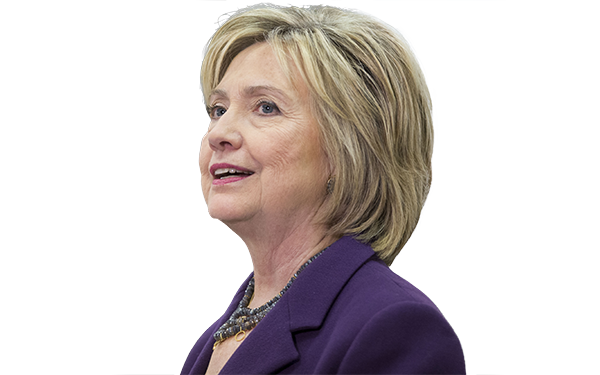In announcing a sweeping initiative to support autistic children and adults and their families, Democratic presidential hopeful Hillary Clinton stood out this week not only for bringing the developmental disorder into the national political spotlight but for framing it in a new way.
"As a country, we must make a priority of supporting the millions of Americans with autism, and their loved ones,” Clinton said Tuesday.
Clinton’s plan includes research and the quest to uncover the why and how of autism but it places just as much emphasis on the factors that will make living with autism better for adults — such as finding and keeping a meaningful job — and children — such as early detection and intervention and not being isolated, bullied or restrained in school.
“It is very commendable that Hilary Clinton has become informed about the needs of children, adults, and families who are affected by autism,” Dr. Robert Koegel, director of Koegel Autism Center at the University of California, Santa Barbara, told The Seventy Four via email. “With the help of the federal government there are many empirically documented interventions that can help to eliminate the problems and challenges that these people face.”
Central to Clinton’s initiative is changing intervention tactics and increasing services and support for students with autism.
The Centers for Disease Control states that 1 in 68 children are diagnosed with the neurological condition that can seriously impair communication and social interaction.
For too many of these children, schools and teachers are often poorly equipped to handle their special learning needs, resulting in ineffective and dangerous intervention tactics such as isolation and force.
So what would Clinton’s plan do for America’s children, and how will her autism campaign improve their lives and education?
1) Early Detection and Preparation: Under Clinton’s plan, Department of Health and Human Services and the Centers for Medicare and Medicaid Services (CMS) would be directed to “provide clear information to physicians and parents so that they know that all Marketplace health plans must cover autism screening at 18 and 24 months.” This early detection strategy aims to ramp up early diagnosis for groups whose warning signs are often overlooked — African-American and Latino children and girls. The earlier (and more cost-effective) the detection of autism, the better families can prepare to face the challenges that come with the diagnosis.
This is critical, because improvements in early detection could lead to better Individualized Education Programs (IEPs) for school-aged children. IEPs specify what types of specialized services and instruction school districts are legally required to provide students with learning challenges. Early detection of autism would allow a child’s education needs to be assessed sooner and worked into an IEP. This, in turn, could ensure that valuable time in the classroom is not wasted with ineffective, or uninformed, teaching methods for autistic students.
2) Changing Classroom Tactics: Passing the Keeping All Students Safe Act is at the center of Clinton’s blueprint for autistic students. The act would change the way classroom interventions are handled with autistic students.
The rise of force in the classroom has seen tactics such as physical restraint commonly used on disabled students, but Clinton aims to end that.
A fresh act of classroom violence surfaced this week with a
cell phone video showing a California teacher’s aide wrestling with and ultimately striking a special education student while two other adults hold the boy’s arms and legs:
With the Keeping All Students Safe Act, physical restraints that restrict breathing would be banned, and parent notification of any intervention that does use restraints or isolation (when other students are deemed at risk without use of such tactics) would be required.
3) Preventing Bullying: Clinton’s plan cites that autistic students are more often the targets of bullies, and often times don't have the capability of explaining or expressing what's happening to someone in a position of authority. Under Clinton’s initiative, she would work closely with the U.S. Department of Education to ensure that autistic students who are targets of bullying are not removed from their classrooms “for their own safety,” which instead leads to isolation, but are rather supported by trained educators in an environment that is highly cultivated to
prevent bullying.
4) Career-Readiness: “Career- and college-ready” are common refrains heard on the campaign trail when candidates talk about education. Under Clinton’s initiative, support for autistic students won’t end when they graduate, or age-out of, high school. Instead, she plans to launch the Autism Works Initiative, and work closely with the DOE to ensure that autistic students have plans and support in place as they transition out of high school.
Currently, autistic students are required by law to be given a post-graduation plan by the age of 16, but Clinton’s plan brings to light that 40% do not have plans developed in the given time frame. Transition plans are vital for graduating on time, securing employment, and connecting with resources necessary to allow young adults with autism to lead productive, independent lives.
Clinton’s announcement was lauded on social media and in the press by advocates, parents and those with autism.
“Oftentimes, autism is portrayed as a sort of tumor – an unpleasant, discrete growth that can be separated from its “host” and destroyed. The thing is, autism doesn’t work that way, and Clinton’s proposal doesn’t act like it does,” Sara Luterman, an autistic writer and blogger
said in The Guardian. “She doesn’t talk about combating autism. Instead, she provides concrete ways to improve the lives of autistic Americans. I am delighted.”
Other candidates may want to take notice of those comments and other similar shows of support for Clinton’s aggressive plan to improve schooling, employment and medical services for autistic children, adults, and families.
Some GOP candidates, like Donald Trump, inaccurately claimed a link between autism and vaccines at the first debate. Bernie Sanders, Clinton’s Democratic rival, has a history of supporting autism initiatives since he’s been in office, co-sponsoring a 2012 Senate bill to expand coverage for autism screening and treatment to military personnel and their families. But there has been no other full-court press and strategy on the issue of autism in this — or any other — presidential race.
Koegel echoed the sentiment of many applauding Clinton’s plan, telling The Seventy Four, “It is refreshing to see a politician who has taken the time to become informed about this topic, and who plans to do things to be of help.”


;)
